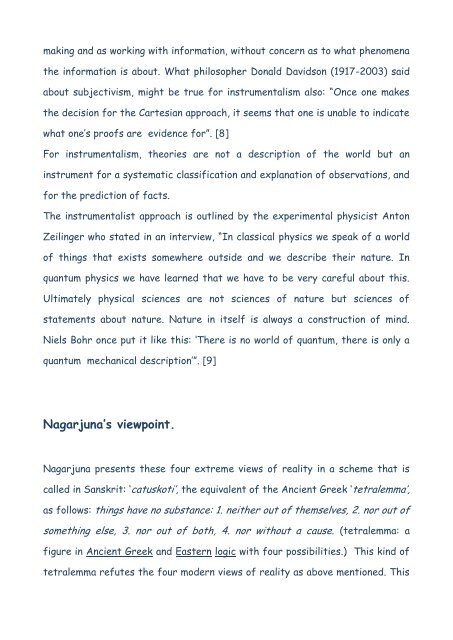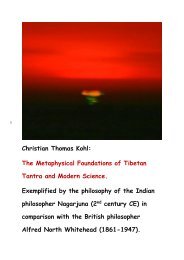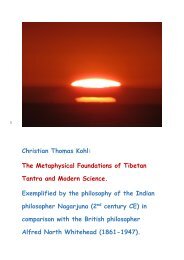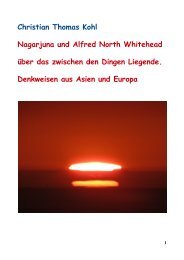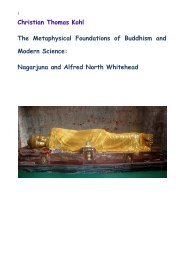The Metaphysical Foundation of Buddhism and Modern Science
The Metaphysical Foundations of Buddhism and Modern Science: Nagarjuna and Alfred North Whitehead
The Metaphysical Foundations of Buddhism and Modern Science: Nagarjuna and Alfred North Whitehead
Create successful ePaper yourself
Turn your PDF publications into a flip-book with our unique Google optimized e-Paper software.
making <strong>and</strong> as working with information, without concern as to what phenomena<br />
the information is about. What philosopher Donald Davidson (1917-2003) said<br />
about subjectivism, might be true for instrumentalism also: “Once one makes<br />
the decision for the Cartesian approach, it seems that one is unable to indicate<br />
what one’s pro<strong>of</strong>s are evidence for”. [8]<br />
For instrumentalism, theories are not a description <strong>of</strong> the world but an<br />
instrument for a systematic classification <strong>and</strong> explanation <strong>of</strong> observations, <strong>and</strong><br />
for the prediction <strong>of</strong> facts.<br />
<strong>The</strong> instrumentalist approach is outlined by the experimental physicist Anton<br />
Zeilinger who stated in an interview, “In classical physics we speak <strong>of</strong> a world<br />
<strong>of</strong> things that exists somewhere outside <strong>and</strong> we describe their nature. In<br />
quantum physics we have learned that we have to be very careful about this.<br />
Ultimately physical sciences are not sciences <strong>of</strong> nature but sciences <strong>of</strong><br />
statements about nature. Nature in itself is always a construction <strong>of</strong> mind.<br />
Niels Bohr once put it like this: ‘<strong>The</strong>re is no world <strong>of</strong> quantum, there is only a<br />
quantum mechanical description’”. [9]<br />
Nagarjuna’s viewpoint.<br />
Nagarjuna presents these four extreme views <strong>of</strong> reality in a scheme that is<br />
called in Sanskrit: ‘catuskoti’, the equivalent <strong>of</strong> the Ancient Greek ‘tetralemma’,<br />
as follows: things have no substance: 1. neither out <strong>of</strong> themselves, 2. nor out <strong>of</strong><br />
something else, 3. nor out <strong>of</strong> both, 4. nor without a cause. (tetralemma: a<br />
figure in Ancient Greek <strong>and</strong> Eastern logic with four possibilities.) This kind <strong>of</strong><br />
tetralemma refutes the four modern views <strong>of</strong> reality as above mentioned. This


